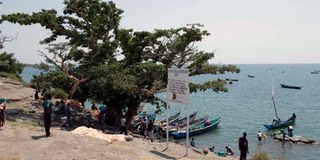Lake Victoria basin dwellers to receive automatic weather alerts

Fishing boats docked offshore at Litare Beach in Rusinga Island, Homa Bay on July 3, 2021.
What you need to know:
- The programme is currently being piloted in Siaya and Busia counties with links to the Kenya Meteorological Department server in Nairobi.
- Lake Victoria Basin Commission Executive Secretary Dr Bwire Masinde said the new technology will help inform both short and long-term decisions.
Dwellers of Lake Victoria basin are set to get early warning system alerts on extreme weather conditions following installation of automatic weather stations in the region.
Lake Victoria Basin Commission (LVBC) noted that the initiative will tackle issues of climate change and avoid disruptions caused by calamities like drought and perennial flooding in the region.
The Sh2.7 million programme, which is currently being piloted in Siaya and Busia counties with links to the Kenya Meteorological Department server in Nairobi, will give timely and accurate information to the residents, fisherfolks and farmers.
LVBC Executive Secretary Dr Bwire Masinde said the new technology will help inform both short and long-term decisions.
Climate change
“For a long period now, the residents and farmers have been facing many uncertainties due to effects of climate change. Decision-makers will now be in a position to focus, anticipate and manage the risks in a timely manner,” he said.
The weather stations are equipped with seven sensors designed to detect crucial meteorological parameters including rain, sunshine, wind speed, humidity, atmospheric pressure and temperature which are recorded in a data logger and transmit the information to a server in Nairobi and also through a website.
The solar-powered gadgets have been installed at the Kenya Forestry Research Institute (Kefri) site at Got Ramogi in Siaya while the Busia one is at St Lukes Odiado Secondary School.
LVBC Project Development Officer Hilda Luoga while underlying the need to invest in adaptation and resilience cautioned that extreme events can reverse development gains made and erode livelihoods.
Displacement
“We are aiming to achieve a five by five kilometre infrastructure in order to achieve accuracy in our focus,” she said.
Ms Luoga indicated that the commission is seeking support from development partners to upscale the project in the region surrounding Lake Victoria.
Adaptation Fund, through the United Nations Environment Programme (Unep), funded the pilot project being implemented in five partner States in the East African Community (EAC).
According to an assessment conducted by LVBC in 2020, the water volume in Africa’s largest fresh-water lake increased marginally compared to 13.41-meter mark recorded on May 5, 1964.
In the resultant outcome, the backflow saw the displacement of thousands of people both in Kenya, Uganda and Tanzania as properties, livestock and acres of land got submerged.





